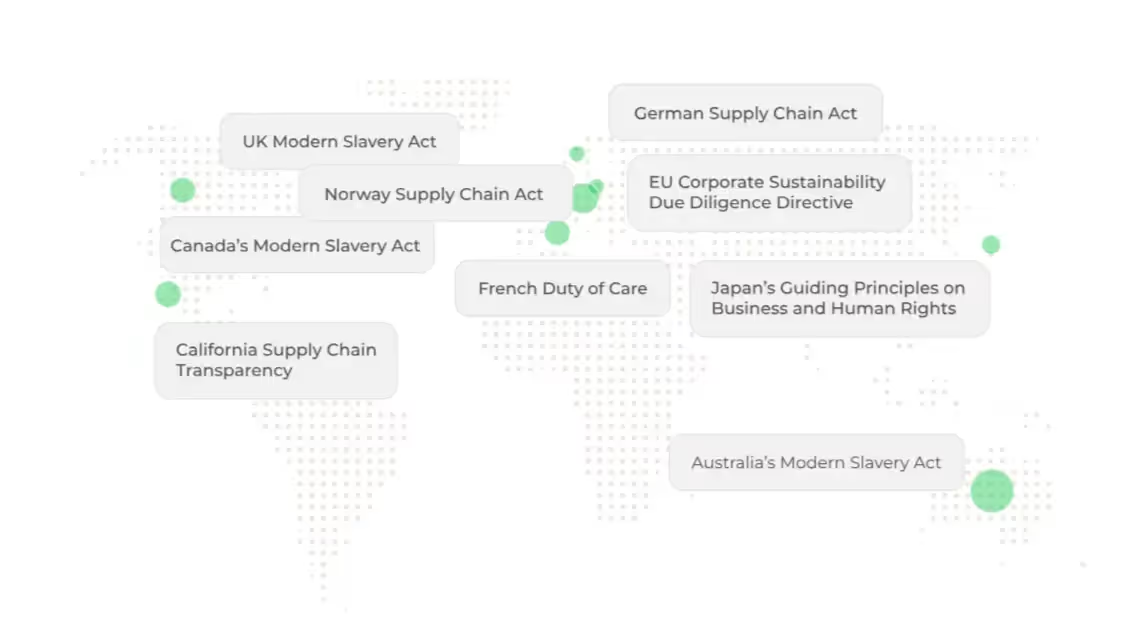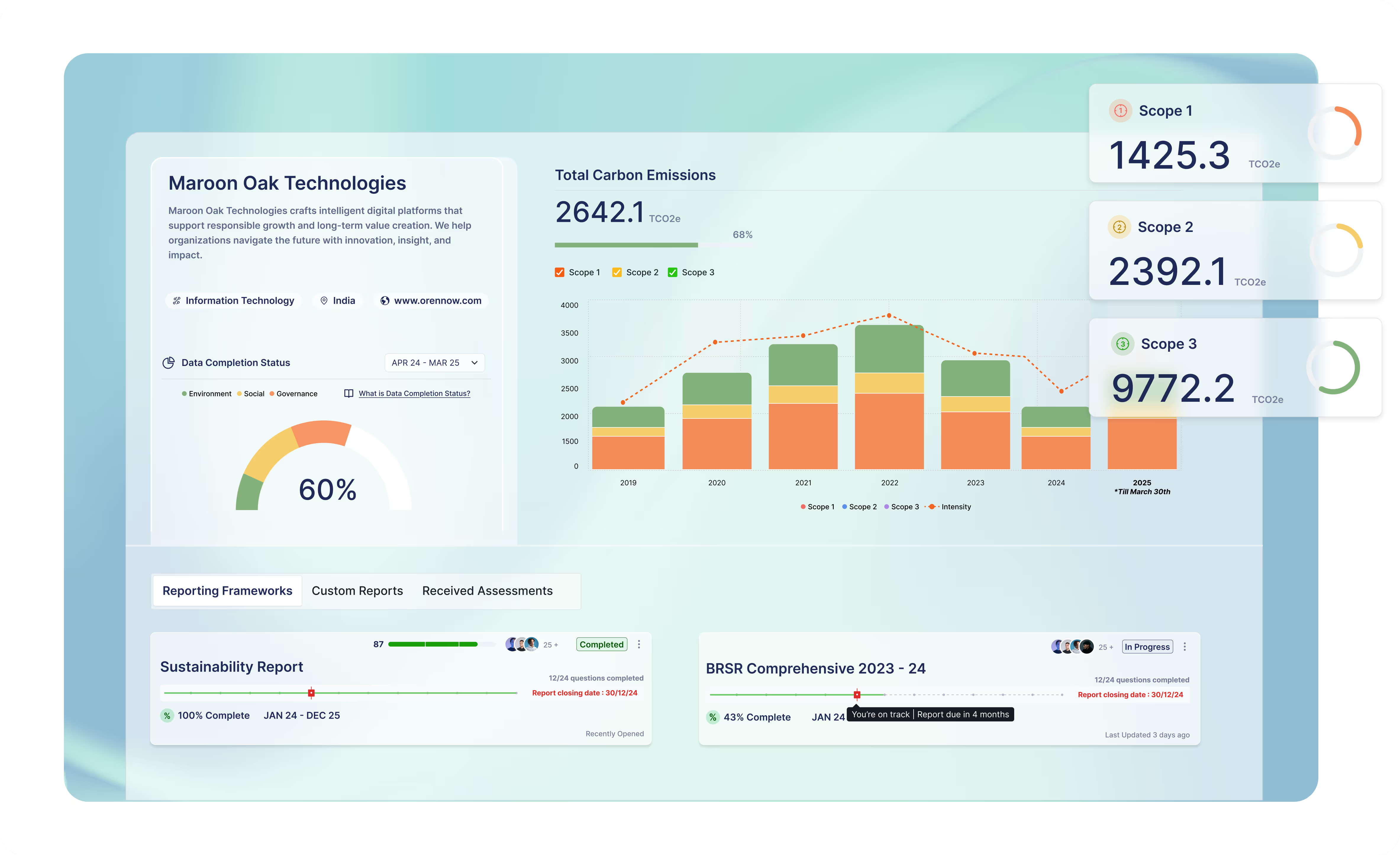How to Promote Sustainable Practices in Suppliers Without High Costs
%2520(2)-p-1080.avif)
Why Supply Chain Sustainability is Important
Supply chain sustainability is a critical focus area for businesses aiming to reduce their environmental impact, enhance social responsibility, and meet regulatory requirements. The role of sustainability in supply chains has grown increasingly important as companies face mounting pressure to align with global standards like the GRI Guidelines and BRSR Reporting in India.
1. Environmental Impact:
Supply chains are responsible for over 80% of a company's greenhouse gas (GHG) emissions, particularly through Scope 3 emissions. The carbon footprint of a business is significantly influenced by its suppliers' activities, such as waste generation and water consumption. As regulatory pressures like the Carbon Border Adjustment Mechanism (CBAM) increase, companies must prioritize their supply chain sustainability to avoid penalties and meet global decarbonization targets.
2. Positive Social Impact:
Sustainable supply chains contribute to improved working conditions, fair labor practices, and community support. Implementing measures like safety training and healthcare initiatives for suppliers can enhance social responsibility and fulfill Environmental, Social, and Governance (ESG) reporting standards.
3. Regulatory Compliance:
Compliance with sustainability regulations, such as the Corporate Sustainability Reporting Directive (CSRD) in Europe and BRSR in India, is crucial. These frameworks require companies to report on their supply chain sustainability efforts, driving transparency and accountability.
4. Consumer Demands:
Modern consumers are increasingly eco-conscious, often influenced by sustainability trends and ESG ratings. Companies transparent about their environmental and social impacts can attract a loyal customer base and enhance brand reputation.
5. Investment Opportunities:
Investors are prioritizing sustainability in their decision-making processes. Firms like Blackstone and KKR are setting sustainability goals for their portfolio companies, making supply chain sustainability a key factor for investment attractiveness.
6. Building Resilience:
Sustainable practices in supply chains not only address environmental and social concerns but also enhance resilience against disruptions like geopolitical conflicts and climate-related events such as floods. This proactive approach helps secure long-term resource availability and supply chain stability.

Strategies for Supplier Sustainability with Limited Budgets
Implementing sustainability practices in supply chains doesn't have to be expensive. Here are several cost-effective strategies that can help companies promote sustainability among their suppliers:
1. Leverage Existing Relationships:
Build on your current supplier relationships to convey your sustainability expectations clearly. Establishing strong communication channels and providing regular feedback can drive suppliers to meet your sustainability goals. Recognize and reward suppliers who excel in sustainability, which can foster a collaborative environment without the need for significant financial investment.
2. Offer Non-Financial Incentives:
Motivate suppliers by offering non-monetary rewards, such as preferred supplier status, extended contracts, or improved payment terms. Publicly recognizing suppliers who achieve sustainability targets can also be a powerful incentive, boosting their reputation and encouraging further progress in their ESG initiatives.
3. Prioritize Sustainability Criteria:
When issuing tenders, make sustainability a key criterion for supplier selection. This approach signals the importance your company places on sustainability, encouraging potential suppliers to align with your environmental and social goals. By integrating sustainability into your procurement processes, you can drive systemic change across your supply chain.
4. Collaborate on Cost Savings:
Partner with suppliers to identify opportunities for cost savings through sustainability initiatives. This could include improving energy efficiency, reducing waste, or optimizing logistics. Shared cost savings can make sustainability efforts more financially viable for both your company and your suppliers.
5. Provide Training and Support:
Invest in training programs and resources to help suppliers enhance their sustainability capabilities. Offering technical support and guidance on best practices can lead to significant improvements in ESG performance, ultimately benefiting your entire supply chain. This investment in supplier development can yield long-term dividends in terms of compliance, resilience, and competitiveness.

Conclusion
Supply chain sustainability is essential for companies aiming to reduce their environmental and social impacts, comply with regulations, and build resilience. Achieving these goals doesn't require a large budget. By leveraging relationships, offering non-financial incentives, and collaborating on cost-saving initiatives, companies can drive significant sustainability improvements in their supply chains.
At Oren, we specialize in helping multinational companies and their suppliers build sustainable supply chains, ensuring compliance with global regulations like BRSR Core and supporting broader sustainability objectives.
Latest Blog Posts
Dive into our blog for insights on making your organization more sustainable.
Sustainability Simplified
Wherever you are in your sustainability journey, we help you advance with confidence.
Schedule a Call



.avif)

